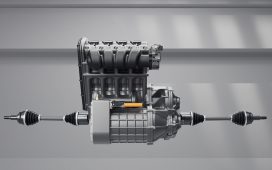Most bright red sports cars do not make much of their green credentials. Yet a test run in Bicester, Oxfordshire, by the startup Zero Petroleum last month gave a glimpse of a future in which combustion engines did not add new carbon to the atmosphere. The car was running on e-fuel: petrol made using electricity, hydrogen from water, and carbon captured from the air.
The automotive industry is steadily moving away from fossil fuels, and a firm global consensus has emerged that battery electric vehicles are the way forward. Yet that consensus took a knock in March when the EU – to the shock of energy experts, environmental campaigners and much of the car industry – opened a small back door to e-fuels.
E-fuels are likely to find a small niche at most, experts predict. In their way stand fundamental constraints of physics, which would require even more green energy. They are made in stages: first by splitting water using electricity to create hydrogen, and then combining it with carbon from CO2 in a process that requires high pressure and a catalyst. Every stage wastes some energy, and all the electricity used must be zero-carbon.
“You’re basically trying to unburn petrol,” said Michael Liebreich, a consultant on clean energy technologies. “You need an insane amount of solar to do that.”
One big problem with the e-fuel dream is actually finding the stuff. There are no plants producing it at scale in the world. Nevertheless, some companies have spotted an opportunity.

Zero Petroleum, which will produce e-fuels on a small scale at its Bicester test factory, was founded by Nilay Shah, a professor of process systems engineering at Imperial College London, with Paddy Lowe, a former technical director at the Formula One teams McLaren and Mercedes, and ex-chief technical officer at Williams.
Its first customer was not a car company, but the Royal Air Force, which flew the first ever flight using only e-fuels in 2021. Experts suggest there is a much more compelling case for the technology in aviation than in cars – in part because there are few better options for planes at this point.
The test site will only produce 30 litres a day; Zero Petroleum is fundraising for a commercial-scale factory that could make thousands of litres. That compares with 41.7bn litres of petrol and diesel used by the UK alone in 2021, according to the pro-motoring thinktank the RAC Foundation.
Shah said: “I wouldn’t say for your everyday, for your private, light vehicle, it makes sense for them to use e-fuels. We didn’t see the primary purpose of e-fuels being small or light goods vehicles.”
The Porsche boss Oliver Blume – who is also chief executive of Volkswagen Group, Europe’s largest carmaker – in March argued that e-fuels could be a “useful addition”, allowing the company to continue selling cars such as the petrol-guzzling 911 for longer.
Porsche has launched a pilot e-fuel plant in Chile (which, with its strong winds and reliable sunshine, has abundant renewable energy).
Parts of the car industry and their political supporters are clinging on to the hope that e-fuels could put off the end of internal combustion engines – and the huge costs involved in shifting millions of workers away from building them. After lobbying from carmakers, Germany’s conservative Free Democratic party, a member of the country’s governing coalition, successfully argued for a last-minute clause, insisting the EU put forward technical standards for e-fuels beyond the 2035 phaseout date for fossil fuel cars.
after newsletter promotion

In a market the size of the global automotive sector, even a tiny niche could be lucrative. Shah pointed out that some petrol vehicles would last considerably longer than the 14 years average before scrappage. Remote communities with tricky access to charging infrastructure may also prefer e-fuels, perhaps in hybrid cars, he suggested.
Collectors’ motors – from existing classic cars or newer supercars – will also need enough fuel for the occasional pleasure drive. “I think those users would see that as a small price to pay to maintain their hobby,” Shah said.
But energy experts are almost unanimous in their opposition to e-fuels being used for new mass market vehicles. Auke Hoekstra, the director of ZEnMo Simulations, an energy transition consultancy, said he saw the recent lobbying of the EU for e-fuels as “a way to keep the dream of the combustion engine alive”.
“It’s more expensive and needs an awful lot of renewable energy to make it,” Hoekstra said. “I’ve never seen anybody who isn’t a real lover of combustion engines ever go for it.”
Transport & Environment (T&E), a campaign group, calculated that 45% of the renewable electrical energy put in to create e-fuels is lost. Another 70% of that remaining energy is lost through inefficient combustion engines as useless noise and heat. That leaves you with 16% of the energy put in being used to propel the car, compared with 77% for using the same amount of electricity in a battery electric vehicle.
European governments would do better to focus their energies on installing enough electric chargers, said Julia Poliscanova, a senior director at Transport & Environment. “Backed by the oil industry, the e-fuels lobby is looking to derail mass electrification,” she added.
Liebreich said he did see a future for some e-fuels in aviation, but not for most cars. “Could you imagine your classic German BMW owner living in Munich driving to a ski holiday?” he said. “It’s not going to happen.”









